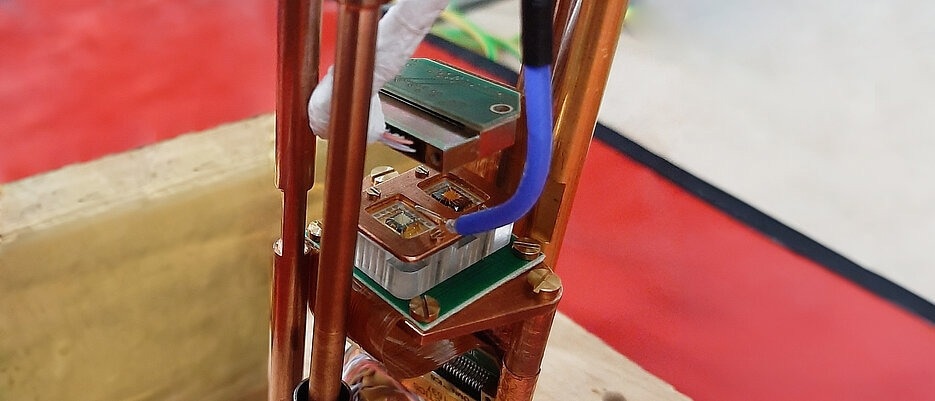Apr 5 2024Reviewed by Lexie Corner
Superconductors are materials that can transmit electricity without electrical resistance, rendering them a perfect base ma for electronic components in MRI machines, magnetic levitation trains, and even particle accelerators. Unfortunately, magnetism tends to disrupt conventional superconductors. An international team of researchers has now created a hybrid device composed of a stable proximitized-superconductor boosted by magnetism, whose operation can be precisely regulated.
 Sample holder for measurements at millikelvin (-273 °C). Image Credit: Mandal/JMU, seitlich erweitert mit Firefly
Sample holder for measurements at millikelvin (-273 °C). Image Credit: Mandal/JMU, seitlich erweitert mit Firefly
The superconductor was coupled with a special type of semiconductor called a topological insulator.
Topological insulators are materials that conduct electricity on their surface but not inside. This is due to their unique topological structure, i.e., the special arrangement of the electrons. The exciting thing is that we can equip topological insulators with magnetic atoms so that they can be controlled by a magnet.
Charles Gould, Professor, Institute for Topological Insulators, University of Würzburg
The superconductors and topological insulators were combined to create a Josephson junction, which is a link between two superconductors separated by a tiny layer of non-superconducting material.
Gould added, “This allowed us to combine the properties of superconductivity and semiconductors. So, we combine the advantages of a superconductor with the controllability of the topological insulator. Using an external magnetic field, we can now precisely control the superconducting properties. This is a true breakthrough in quantum physics!”
Superconductivity Meets Magnetism
Superconductivity and magnetism are normally opposite phenomena that sometimes coexist. They are coupled in an exotic state created by the unique combination. The Fulde-Ferrell-Larkin-Ovchinnikov (p-FFLO) state is the term used to describe this.
For practical applications, including the creation of quantum computers, the novel “superconductor with a control function” could be significant. In contrast to conventional computers, quantum computers rely on quantum bits, or qubits, which are capable of assuming several states concurrently rather than just two.
“The problem is that quantum bits are currently very unstable because they are extremely sensitive to external influences, such as electric or magnetic fields. Our discovery could help stabilize quantum bits so that they can be used in quantum computers in the future,” Gould added.
International Quantum Research Team
A group from Professor Laurens W. Molenkamp’s Chair of Experimental Physics III at Würzburg conducted the experimental research. The study was carried out in close cooperation with theoretical experts from Professor Teun M. Klapwijk of Delft University of Technology in the Netherlands and Professor F. Sebastian Bergeret of the Centre for Materials Physics (CFM) in San Sebastian, Spain.
The German Research Foundation (DFG), the Free State of Bavaria, the Spanish Agencia Estatal de Investigación (AEI), the Cluster of Excellence ct.qmat (Complexity and Topology in Quantum Materials), the European research program Horizon 2020, and the EU ERC Advanced Grant Programme provided funding for the multinational research group.
Journal Reference:
Mandal, P., et al. (2024) Magnetically tunable supercurrent in dilute magnetic topological insulator-based Josephson junctions. Nature Physics. doi:10.1038/s41567-024-02477-1
Source: https://www.uni-wuerzburg.de/en/